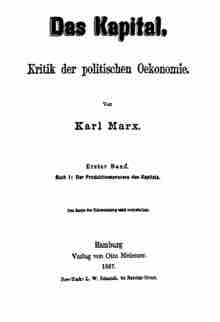As the century most associated with industrialization and capitalism in the West, the 19th century looms large in the history of economic policy and economic thought.
The beginning of the 19th century was dominated by "classical economists," a group not actually referred to by this name until Karl Marx. One unifying part of their theories was the labor theory of value, contrasting to value deriving from a general equilibrium of supply and demand. These economists had seen the first economic and social transformation brought by the Industrial Revolution: rural depopulation, precariousness, poverty, and apparition of a working class. They wondered about the population growth because the demographic transition had begun in Great Britain at that time. They also asked many fundamental questions about the source of value, the causes of economic growth, and the role of money in the economy. They supported a free-market economy. They argued that it was a natural system based upon freedom and property. However, these economists were divided and did not make up a unified group of thought.
A notable current within classical economics was the under-consumption theory, as advanced by the Birmingham School and Malthus in the early 19th century. The theory argued for government action to mitigate unemployment and economic downturns. It was an intellectual predecessor of what later became Keynesian economics in the 1930's.
Just as the term "mercantilism" had been coined and popularized by its critics like Adam Smith, so was the term "capitalism" or Kapitalismus used by its dissidents, primarily Karl Marx. Karl Marx (1818–1883) was, and in many ways still remains, the pre-eminent socialist economist. His combination of political theory represented in the Communist Manifesto and the dialectic theory of history inspired by Friedrich Hegel provided a revolutionary critique of capitalism as he saw it in the 19th century. The socialist movement that he joined had emerged in response to the conditions of people in the new industrial era and the classical economics which accompanied it. He wrote his magnum opus Das Kapital at the British Museum's library .

Das Kapital
Karl Marx's definition and popularizing of the term "capitalism" or Kapitalismus, as defined in "Das Kapital," first published in 1867, remains one of the most influential works on the subject to this day.
In the 1860's, a revolution took place in economics. The new ideas were that of the Marginalist school. Writing simultaneously and independently, a Frenchman (Léon Walras), an Austrian (Carl Menger), and an Englishman (Stanley Jevons) were developing the theory that had some antecedents. Instead of the price of a good or service reflecting the labor that has produced it, it reflected the marginal usefulness (utility) of the last purchase. This meant that in equilibrium, people's preferences determined prices including, indirectly, the price of labor.
This current of thought was not united. There were three main schools working independently. The Lausanne school, whose two main representatives were Walras and Vilfredo Pareto, developed the theories of general equilibrium and optimality. The main written work of this school was Walras' Elements of Pure Economics. The Cambridge school appeared with Jevons' Theory of Political Economy in 1871. This English school developed the theories of the partial equilibrium and insisted on markets' failures. The main representatives were Alfred Marshall, Stanley Jevons, and Arthur Pigou. The Vienna school was made up of Austrian economists Menger, Eugen von Böhm-Bawerk, and Friedrich von Wieser. They developed the theory of capital and tried to explain the presence of economic crises. It appeared in 1871 with Menger's Principles of Economics.